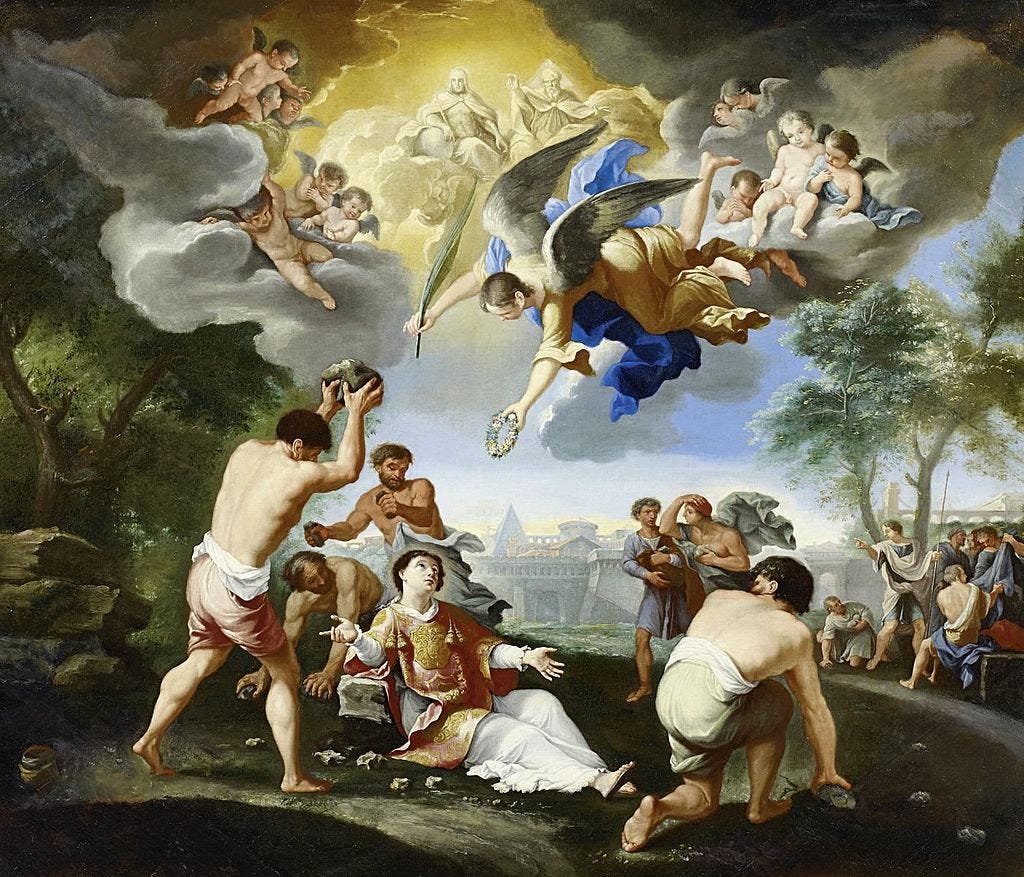
Christmas Day may have passed, but December 26 is both the second day of Christmas and another Holy Day, this one celebrating the first martyr of the church. Stephen’s story is found in Acts chapters 6 and 7. Stephen was called “a man full of faith and of the Holy Spirit,”1 and was one of seven men chosen to serve in the daily distribution of food to the poor, so that the apostles could devote more of their time to prayer and preaching.2
But Stephen apparently also preached the Gospel, as well as performing signs and wonders. Some non-Christian Jews tried to argue with him, “but they could not withstand the wisdom and the Spirit with which he was speaking.”3 So, they stirred up a mob against him that dragged him before the Sanhedrin, the council of religious leaders in Jerusalem. False witnesses lied about what he was teaching, and so the council asked him to explain the claims that Jesus would destroy the Temple and change the customs of Moses.
Stephen’s response is a relatively long summary of Israel’s history, but the points he made were that God had never dwelt in one man-made place (such as the Temple), and that the Jewish people had often rejected the prophets that were sent by God. Clearly, he was not seeking to defend himself, but rather to proclaim the truth of Christ to his listeners. Immediately after, he saw a vision of Jesus standing at the right hand of the Father, and he described it to the religious leaders.4
Most of his listeners, though, were enraged. They dragged him out of the city and stoned him to death. Stephen’s final words, though, remind us of Christ’s proclamation of forgiveness on the cross:
And as they were stoning Stephen, he called out, “Lord Jesus, receive my spirit.” And falling to his knees he cried out with a loud voice, “Lord, do not hold this sin against them.” And when he had said this, he fell asleep.5
The beginning of Acts 8 says that Stephen’s martyrdom began a great persecution that led to the scattering of the Christian church throughout the region. His burial is also recorded.6
Stephen is mentioned two more times in Acts. Acts 11:19 mentions the persecution that began at Stephen’s martyrdom, which led to the spread of Christianity to Antioch. Finally, in Acts 22:20, as Paul is defending himself before the people of Jerusalem, he states that he was there at and approved of the death of Stephen, before his own encounter with Christ.
what can we learn from Stephen?
Like Stephen, we should seek to be filled with faith and the Holy Spirit. Acts 13:52 tells us that even in the face of persecution, “the disciples were filled with joy and with the Holy Spirit.”7
Stephen, though he recognized the legitimacy of the religious authorities, nevertheless stood up to them when they challeneged Jesus’ teaching. Isaiah 1:17 says “learn to do good; seek justice, correct oppression; bring justice to the fatherless, plead the widow’s cause.”8 Peter and John, when they were told by the same council that condemned Stephen that they should stop preaching in the name of Jesus, Peter replied ““Whether it is right in the sight of God to listen to you rather than to God, you must judge, for we cannot but speak of what we have seen and heard.”9
The murder of Stephen led to persecution that drove many Christians out of Jerusalem, scattering them throughout the region. Yet this became an opportunity for Christianity to spread and grow rather than to be suppressed. Paul tells us “We know that for those who love God all things work together for good, for those who are called according to his purpose.”10 As Paul, who went from persecuting Stephen and his fellow believers to suffering for Christ, says:
We rejoice in our sufferings, knowing that suffering produces endurance, and endurance produces character, and character produces hope, and hope does not put us to shame, because God’s love has been poured into our hearts through the Holy Spirit who has been given to us.11
I don’t know that I’ll ever have the opportunity to suffer for Christ on the level of Stephen or the Jerusalem church, but if I do, I hope that God will give me the strength to rejoice in it.




